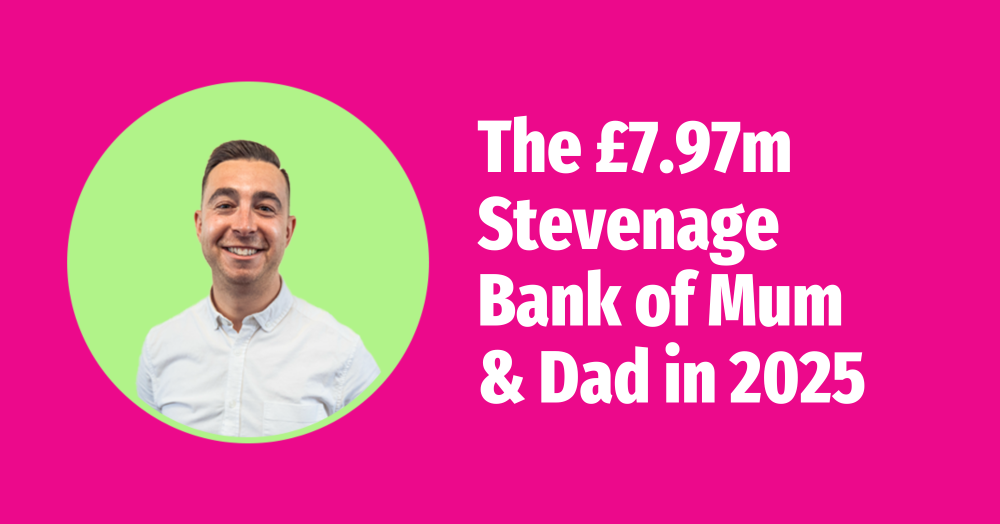Whether you're a parent, buyer, or just curious about what this means for Stevenage housing market, this article explores both the help and the hurdles behind one of our town's biggest unspoken trends.
In today’s Stevenage property market, the Bank of Mum and Dad remains a powerful force — and it’s only grown more influential. For many first-time buyers in Stevenage, parental help is not just a boost, it’s often the key to the front door.
But is this a sign of generosity? Or a symptom of something much deeper going on in our housing system?
In Stevenage (SG1/2), the bank of Mum and Dad has given £7,968,766 in deposit contributions in the last 12 months alone to Stevenage first-time buyers.
The typical Stevenage first-time buyer property now costs £333,300 and although the lenders still only ask for a minimum deposit of 5%, the average deposit is just over 16%.
That means many Stevenage buyers are coming up with an average deposit of £53,995. A sizeable £23,623 of that is being provided by parents (The Bank of Mum and Dad).
While help from family is undeniably valuable and often given with love, it’s also created a divide. Those lucky enough to receive support are moving forward, while those without it are left wondering if they'll ever own a home.
Over half of first-time buyers under 35 across the UK now rely on parental help in some form. And it’s not just lump sums anymore. Some parents are leveraging their own homes to springboard their children into property ownership. Others are going in on joint mortgages or acting as guarantors. The routes are varied — but they all rely on one thing: having access to wealth in the first place.
This growing reliance on family wealth to secure housing has led one commentator (Eliza Filby) to coin the phrase ‘inheritocracy’. It's the idea that life milestones — from getting on the property ladder to starting a family — are increasingly determined not by what you earn or learn, but by what you inherit. Or, more often these days, what you’re gifted early.
Now, before we get too misty eyed about the good old days, it’s worth remembering that the average first-time buyer age is now 34 nationally (it’s been between 32 and 34 years old since the millennium). And it’s no wonder: wages haven’t kept up with house prices, rent is eating into savings, and deposits are higher than ever.
For many, the Bank of Mum and Dad isn’t a nice-to-have,
it’s the only route to buying a Stevenage home.
But here’s the thing: you don’t have to have wealthy parents to buy a home. It might feel that way, especially when headlines are full of six-figure gifts and inheritance windfalls. Yet there are still 95% mortgages available, and a growing number of lenders are reintroducing innovative products like springboard and family offset mortgages. Some local building societies and high street names are even offering 100% loans in specific circumstances.
Schemes like shared ownership and Lifetime ISAs continue to support those who are prepared to think differently. And even the government stamp duty relief for first-time buyers has dropped from £425,000 to £300,000, that is better than second time buyers stamp duty threshold and still provides a leg-up for many.
Yet at the same time, the Stevenage rental
market has seen a shift in sentiment.
Increasingly, renting isn’t viewed as a failure, but as a flexible lifestyle choice. Some younger Stevenage residents are opting to rent longer while focusing on careers, saving strategically, or even planning to inherit in later life. The stigma is fading.
There’s a cultural shift underway too. More and more young people are openly acknowledging the support they've had. But others — those without parental help — are voicing growing frustration at what they see as an uneven playing field. We’re not just talking about a gap between generations anymore. We’re talking about gaps within generations.
In this context, it’s clear that the Bank of Mum and Dad is both a lifeline and a lightning rod. It helps people buy homes, yes. But it also reinforces wealth divides. That’s not a criticism of those who give or receive help — it’s simply the reality of a system where property ownership is increasingly out of reach without it.
As a local Stevenage estate agent, I see the joy that buying a home brings. And I understand the pressures families feel to provide that step up. But I also see the quiet resilience of those buyers doing it alone, scraping together deposits, working multiple jobs, and thinking creatively to make homeownership happen.
So, what’s the takeaway here in Stevenage?
If you’re a Stevenage parent with the means to help, you’re not alone. But before gifting a deposit, have the tough conversations. Is it a gift or a loan? What are the expectations? Will it affect your retirement or your care needs in later life?
If you’re a buyer without family support, don’t lose hope. Explore every scheme. Look into chatting with the banks and building societies. Talk to mortgage brokers. Ask your estate agent questions. There are still paths to ownership.
And if you’re a policymaker? Perhaps the focus needs to shift from helping people buy, to helping build. More homes, more variety, more affordability. That’s the long-term solution.
In the meantime, the Bank of Mum and Dad continues to be the quiet partner in many Stevenage property deals. But let’s not mistake it for a fix. It’s a workaround — a generous one, yes, but still a workaround.
And one that speaks volumes about the state of our housing market in 2025.

